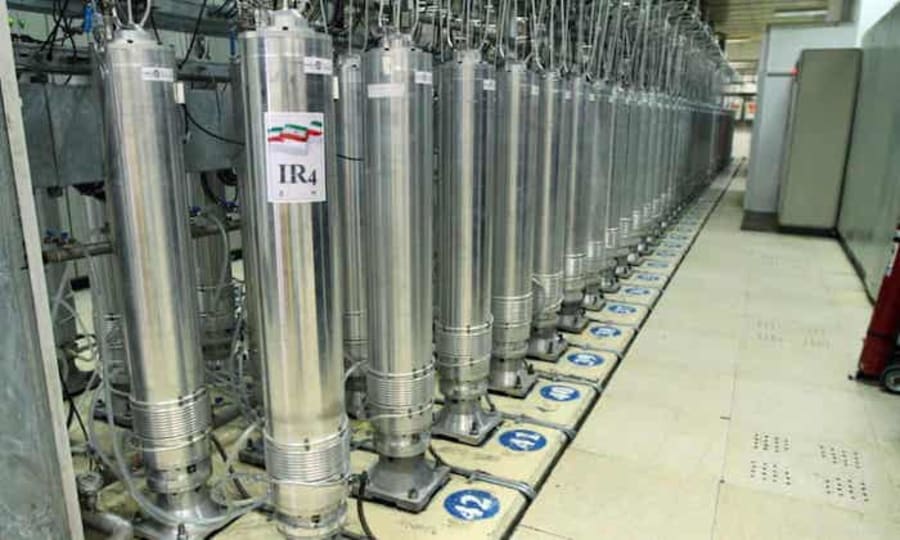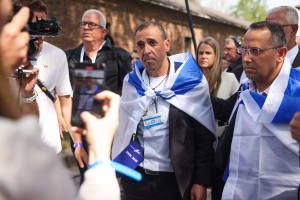Damaged Iranian nuclear site reportedly on Israeli hit list
IDF chief on US visit stresses the “failures of the current nuclear deal,” offers alternate solutions to dealing with Iranian nuclear program

An Iranian nuclear centrifuge production site that was allegedly damaged during a drone attack on Wednesday reportedly appeared on an Israeli hit list that Jerusalem presented to the former Trump administration in 2020, an unnamed intelligence source told the New York Times.
The Iran Centrifuge Technology Company facility known as TESA, which is located outside the capital Tehran, plays a pivotal role for the enrichment of uranium according to Iranian opposition sources.
While Iranian officials initially denied that the TESA facility was damaged, the drone strike reportedly did cause damage to the nuclear facility, according to unnamed reports in Israeli media on Wednesday. The drone attack was apparently launched from Iranian territory, not far away from the key site. If true, it would constitute another failure by the Iranian intelligence’s efforts in stopping anti-regime operations on Iranian soil. While Iran’s regime has so far not accused the Jewish state of being behind the latest incident, Tehran has blamed Israel for several previous attacks on Iranian key nuclear sites.
By contrast, the Iranian Mehr News Agency claimed that the attack on the nuclear site failed and the drone was shot down. However, the Iranian regime initially also denied last year’s damaging attacks on the key Natanz nuclear facility.
The importance of the TESA facility is linked to its key role in replacing the centrifuges at the Natanz nuclear facility that were damaged due to sabotage in 2020. TESA reportedly also manufactures more advanced centrifuges that can dramatically shorten the time needed to produce enriched uranium.
Meanwhile, U.S. National Security Advisor Jake Sullivan told IDF chief Aviv Kochavi on Wednesday that the American President Joe Biden has a “commitment to ensuring that Iran never gets a nuclear weapon,” according to the White House. Kochavi, who led a delegation of senior Israeli military officials, arrived in the U.S. with the purpose of warning the Biden administration against reentering the controversial Iranian 2015 nuclear deal.
The IDF chief stressed the “failures of the current nuclear deal” and tried to convince the Americans to pursue a different path in the effort to preventing the ayatollah regime from acquiring nuclear weapons. The Former U.S. President Donald Trump left the Iran nuclear deal in 2018 and put severe economic sanctions on Tehran.
Biden has indicated on several occasions that he is interested in a stronger nuclear deal with Iran. However, the election of the radical Ebrahim Raisi as Iran’s next president complicates the Biden administration’s efforts to strike a new nuclear deal with the Iranian regime.
Foreign media has attributed a string of attacks on Iranian nuclear sites to Israel. While neither the Netanyahu nor the Bennett governments have confirmed, former Mossad chief Yossi Cohen indirectly confirmed in a recent interview that Israel was responsible for both the Natanz blast in 2020 and the assassination of the Iranian nuclear chief Mohsen Fakhrizadeh.
“We say very clearly [to Iran]: We won’t let you get nuclear weapons. What don’t you understand?” said Cohen in a recent candid interview in Israeli media.
Preventing the Iranian regime from acquiring nuclear weapons has been at the forefront of former Israeli Prime Minister Benjamin Netanyahu’s foreign policy for over a decade. Prior to the establishment of the new Bennett-led government, Netanyahu warned the Israeli public that Bennett would not be able to stand up to the Iranian ayatollah regime.
Bennett’s strong stand, however, against the newly elected hardline Iranian President Raisi and the alleged attack on the Iranian nuclear site could indicate that he is dealing with the Iranian nuclear threat in a similar way to his predecessor.

The All Israel News Staff is a team of journalists in Israel.














